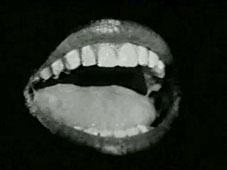 A TV screening in 1970s of this mouth muttering in darkness was my first introduction to Beckett‘s work and a very memorable and disturbing introduction it was. It made no sense at the time since I had no cultural context in which to place it, it felt like being plugged directly into some kind of fever dream. The brilliance of Beckett’s work is reinforced by the way the repetitions and evasions of this piece often came to mind during fevers of my own, those moments when you’re ill and trying to sleep and the brain is caught in a recursive loop from which there seems to be no escape. Beckett at his best succeeds in fixing these twilight states in a way that few other writers achieve so it’s good to be able to see this again. The version at Ubuweb is the BBC rescreening from 1990 that included an introduction by Billie Whitelaw.
A TV screening in 1970s of this mouth muttering in darkness was my first introduction to Beckett‘s work and a very memorable and disturbing introduction it was. It made no sense at the time since I had no cultural context in which to place it, it felt like being plugged directly into some kind of fever dream. The brilliance of Beckett’s work is reinforced by the way the repetitions and evasions of this piece often came to mind during fevers of my own, those moments when you’re ill and trying to sleep and the brain is caught in a recursive loop from which there seems to be no escape. Beckett at his best succeeds in fixing these twilight states in a way that few other writers achieve so it’s good to be able to see this again. The version at Ubuweb is the BBC rescreening from 1990 that included an introduction by Billie Whitelaw.
Not I (1973)
149.6 mb (avi), 15’06”
Starring and Introduced by Billie Whitelaw
Not I takes place in a pitch black space illuminated only by a single beam of light. This light illuminates an actress’s mouth. The mouth utters a monologue of fragmented, jumbled sentences which gradually coelesces into a narrative about a woman who has suffered an unpleasant experience. The title comes from the character’s repeated insistence that the events she describes did not happen to her.
The stage directions also call for a character called ‘the Auditor’ who wears a black robe and can be dimly seen at the back of the stage, occasionally raising its hands in a gesture of impatience. When Beckett came to be involved in staging the play, he found that he was unable to place the Auditor in a stage position that pleased him, and consequently allowed the character to be omitted from those productions. However, he did not decide to cut the character from the published script, and whether or not the character is used in production seems to be at the discretion of individual producers. As he wrote to two American directors in 1986: “He is very difficult to stage (light–position) and may well be of more harm than good. For me the play needs him but I can do without him. I have never seen him function effectively.”
Previously on { feuilleton }
• Film by Samuel Beckett
